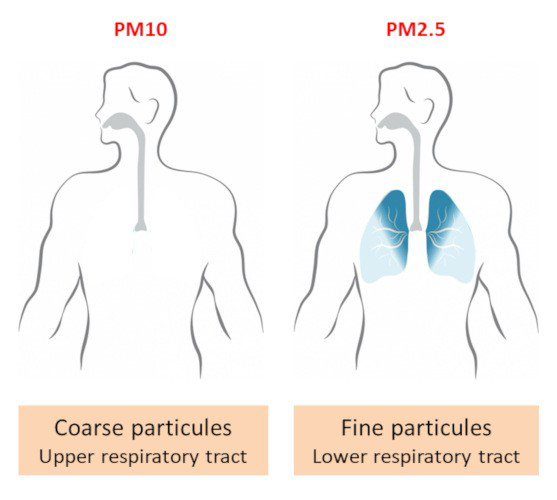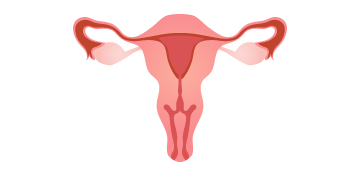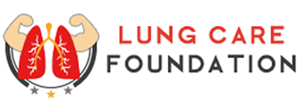Air pollution has become a major health problem in Delhi-NCR. The effects of poor air quality on health are wide-ranging. Inhaling polluted air can have a serious impact on your health because these pollutants get deposited in various organs like lungs and do permanent damage.
Depending on their sizes, these pollutants can reach:
- PM10: These pollutants get deposited in our respiratory pipe
- PM2.5: These pollutants get deposited in our lungs and even smaller particles reach bloodstream through alveoli


EYE
First impact of pollution on our bodies are usually seen on our eyes. Exposure to polluted air can cause the following problems in our eyes:
- Itching
- Irritation
- Redness
- Watering of eyes
- Burning sensation
- Dryness
- Vision problem
- Eyelid swelling
- Allergic conditions
- Other infections in the eyes

BRAIN
Prolonged exposure to air pollution especially in high concentrations of ultrafine particulate matter can lead to:
- Inability to interact and communicate
- Inflammation and degeneration of neurons in brain
- Depression
- Decrease in intelligence and understanding abilities
- Developmental disabilities
- Behavioural abnormalities and many more

SKIN
Our skin and hair also get highly affected by pollution. Even short-term exposure can cause the following problems in our skin:
- Redness, inflammation and itchiness
- Skin rashes
- Skin allergy
- Dull and dry skin
- Acne
- Pigmentation
- Skin cancer

REPRODUCTIVE & NEONATAL EFFECT
Air pollution is known to have very adverse effect on reproductive and neonatal health. Some of the common problems linking air pollutions and reproductive / neonatal health are mentioned below:
- Low fertility rate
- Abnormal number of chromosomes in the sperm
- Abortion
- Low birth weight
- Neonatal mortality
- Post neonatal mortality
Important Facts: A 10-μg/m3 (micrograms/cubic metre) increase in pregnancy period PM2.5 exposures were associated with a 4g decrease in birth weight and 2% increase in the prevalence of low birth weight (Balakrishnan K et al. 2018).

RESPIRATORY EFFECTS
Respiratory system and lungs being the first line of defence for the body to deal with air and its pollutants is the most affected human organ when concerned to air pollution. Some common effects are mentioned below:
- Cough
- Wheezing
- Shortness of breath
- Airway obstruction
- Asthma
- Air sacks in the lungs get damaged
- Chronic Obstructive Pulmonary Disease
- Lung Cancer
- Pneumonia
Do you know? - Air pollution accounts for 41% of global deaths from chronic obstructive pulmonary disease (COPD), 19% of deaths from lung cancer and 35% of deaths from lower-respiratory infection (State of Global Air Report 2019).

CARDIOVASCULAR EFFECTS
Air pollution is known to cause great effect on the cardiovascular system. Research studies have shown links between prolonged exposure to air pollution and cardiovascular problems such as:
- Increase risk of myocardial infarction
- Coronary artery disease
- Reduced blood supply to the heart
- Heart failure
- Irregular heartbeat
- Stroke
- Increase risk of cardiovascular mortality
- Hypertension
- Thickening and hardening of the walls of the arteries and others
Do you know? - 16% of deaths occur from ischemic heart disease and 11% of deaths from stroke (State of Global Air Report 2019).

LIVER
Exposure to polluted air can cause the following problems in our liver:
- Type II diabetes
- Liver cancer

GASTROINTESTINAL EFFECT
Research studies have shown links between prolonged exposure to air pollution and gastrointestinal problems such as:
- Appendicitis
- Inflammatory bowel disease
- Increases intestinal permeability

KIDNEY
Exposure to polluted air can cause the following problems in our kidneys:
- Reduced kidney function
- Damage and thickening of small blood vessels in kidney
- Chronic kidney disease
Effects on Children

- Air pollution stunts the growth of lungs and IQ development.
- Air pollutants get deposited in their lungs, which slows the development of healthy lungs in children.
- As children breathe in more air, pollutants in more volumes get deposited in their lungs, alveoli and other organs.
- Children often breathe with their mouth bypassing their nose filtration system. Hence more pollutants get accumulated in their lungs and could also enter their bloodstream.
- Air pollutants can cause heart and brain diseases by entering your bloodstream.
Effects on Pregnant Women

- The Placenta is the source of growth and development of the fetus. Because it's so significant, it becomes a pathway for exposure of the fetus (unborn baby), when the mother is exposed to air pollution.
- During pregnancy, a woman's rate of breathing is higher, which increases the exposure for her and the fetus.
- Breastfeeding is considered the best source of nutrition for infants. However, air pollutants get accumulated in breast milk, which results in exposure of the infant.
- PM, NOx, SO2, CO and O3 have been associated with adverse birth outcomes and low birth weight.
Effects on Elderly

- Air pollutants can contribute to chronic lung diseases.
- Existing chronic diseases worsen on exposure to air pollutants over time.
- Asthma, pneumonia and influenza have been associated with exposure to PM10, NO2 and O3.
- Short-term exposure to air pollution is associated with increased hospitalizations for COPD, asthma and pneumonia.





